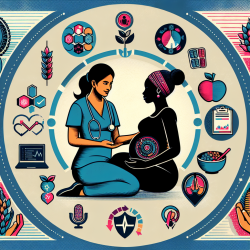Introduction
In the field of special education, understanding the nutritional needs of children is paramount. The research article "Complementary feeding: a Global Network cluster randomized controlled trial" provides critical insights into the impact of complementary feeding on child development. This blog explores the key findings and offers guidance on how practitioners can implement these outcomes to enhance their practice.
Key Findings from the Study
The study conducted a cluster randomized efficacy trial to test the hypothesis that daily intake of beef as a complementary food would result in greater linear growth velocity compared to a micronutrient-fortified rice-soy cereal supplement. The research was carried out in Guatemala, Pakistan, the Democratic Republic of the Congo, and Zambia, targeting communities with high rates of toddler stunting.
Key outcomes measured included:
- Anthropometry (growth measurements)
- Dietary variety and diversity scores
- Biomarkers of iron, zinc, and Vitamin B12 status
- Neurocognitive development
- Incidence of infectious morbidity
Implementing Research Outcomes
Practitioners can leverage these findings to improve complementary feeding practices in educational settings:
- Promote Animal Source Foods (ASF): Encourage the inclusion of meat in children's diets, especially in communities where plant-based diets are predominant. This can help improve growth and cognitive outcomes.
- Nutrition Education: Provide education to parents and caregivers about the importance of diverse and nutrient-rich complementary foods.
- Monitoring and Assessment: Regularly assess children's growth and nutritional status to ensure they are meeting developmental milestones.
Encouraging Further Research
While this study provides valuable insights, further research is necessary to explore the long-term impacts of complementary feeding practices. Practitioners are encouraged to engage in ongoing research and contribute to the growing body of knowledge in this area.
Conclusion
The findings from the "Complementary feeding: a Global Network cluster randomized controlled trial" offer a strong rationale for enhancing complementary feeding practices. By incorporating these insights into educational programs, practitioners can significantly improve the growth and development outcomes for children in low-resource settings.
To read the original research paper, please follow this link: Complementary feeding: a Global Network cluster randomized controlled trial.










